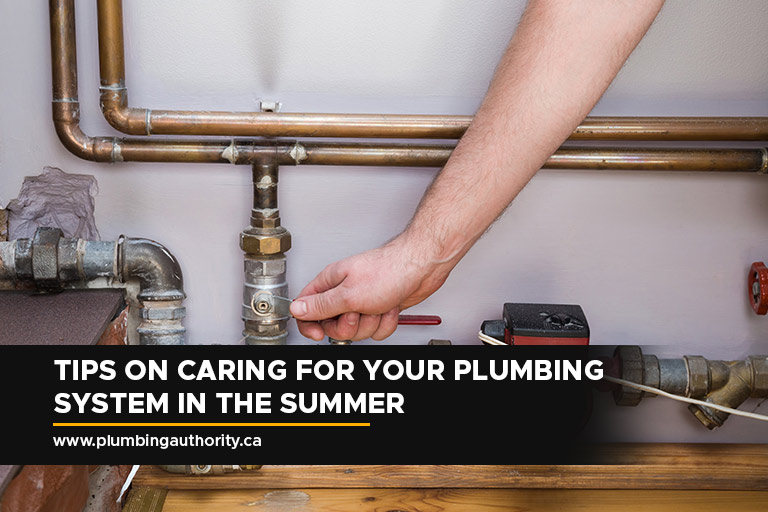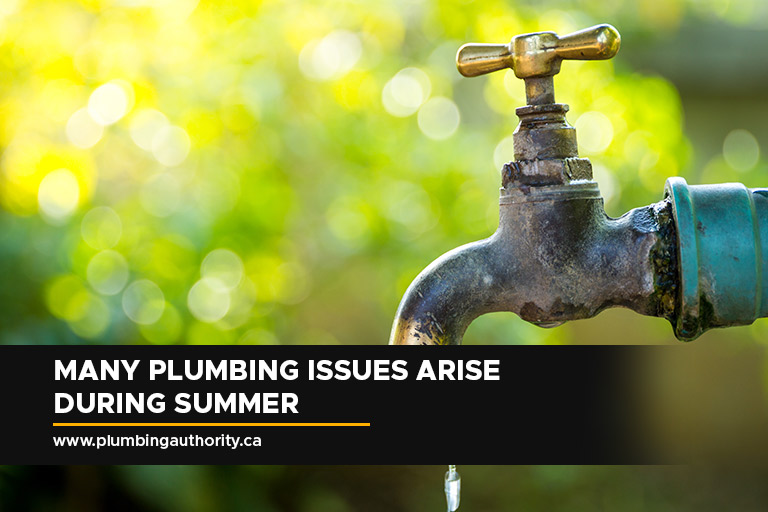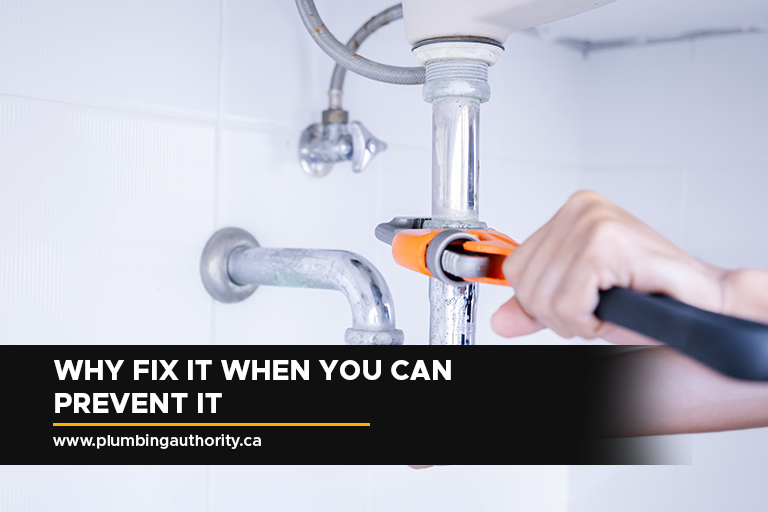
As the summer season rolls in, we find ourselves embracing the warm weather, outdoor activities, and an overall sense of relaxation. While you may be preoccupied with vacations, barbecues, and pool parties, it’s important not to overlook the maintenance needs of your home’s plumbing system. The summer months bring unique challenges to your plumbing, ranging from increased water usage to potential outdoor plumbing issues. Therefore, to help you keep your plumbing system in optimal condition during this season, we have compiled a comprehensive list of essential tips and practices. By following these guidelines, you can ensure a trouble-free summer, free from unexpected plumbing mishaps that could put a damper on your plans.
Plumbing Problems in Summer

Many plumbing issues arise during summer
Plumbing issues are a silent enemy that may cause havoc in our homes, potentially disrupting summer activities. Yes, the summer poses a number of special problems for our plumbing systems, but being aware of them can prevent unpleasant surprises and expensive repairs.
Plumbing Issues: Diagnosis and Fixes
Prepare to combat the heat by arming yourself with the knowledge you need for a problem-free summer.
- Faucet Leaks
During the summer, faucet leaks become more noticeable due to increased usage and higher water pressure. The hot weather can cause the rubber washers inside the faucet to dry out and crack, leading to leaks. These leaks not only waste water but can also result in higher water bills.
Diagnose: Check for any visible leaks around the faucet or underneath the sink. Listen for dripping sounds or look for water stains. Confirm if the leak occurs only when the faucet is turned on or if it continues even when it’s off.
Fix: Replace the worn-out rubber washer or O-ring inside the faucet. Turn off the water supply, disassemble the faucet, replace the damaged parts, and reassemble it tightly. If the leak persists, consider seeking help from a professional plumber.
- Clogged Toilets
Summer activities often involve more guests and increased bathroom usage, which can put additional strain on your toilets. Clogged toilets can occur due to excessive toilet paper usage, sanitary products, or foreign objects being flushed. The heat can also speed up the decomposition of waste, making it easier for blockages to form.
Diagnose: If the toilet bowl fills up and drains slowly or if it overflows, it’s likely clogged. Confirm if other drains in your home are functioning properly to rule out a main sewer line issue.
Fix: Use a plunger to create suction and try to dislodge the clog. If that doesn’t work, you can try using a toilet auger or a plumbing snake to break up the blockage. In severe cases, or if the clog persists, it’s best to contact a plumber to avoid causing further damage.
- Sump Pump Issues
Summer storms can bring heavy rainfall, and if your home has a sump pump, it plays a crucial role in preventing basement flooding. However, during the summer, the pump can become overwhelmed by excessive rainwater, leading to malfunctions or failure. It’s important to ensure your sump pump is well-maintained and capable of handling the increased water flow.
Diagnose: Test your sump pump by pouring water into the sump pit. If the pump doesn’t activate or if it struggles to remove the water, it may be malfunctioning.
Fix: Ensure the pump is plugged in and the float switch is not obstructed. Clean any debris from the pump and pit. If the pump still doesn’t work, contact a professional plumber to inspect and repair or replace the sump pump if necessary.
- Clogged Drainage
Summer activities often involve outdoor cooking, gardening, and pool usage, which can lead to debris and dirt accumulating in outdoor drains. This buildup can result in clogged drainage systems, causing water to back up and potentially flooding your landscape.
Diagnose: If water is pooling in your yard or near outdoor drains, it indicates a possible clog. Look for any visible debris or blockages in the drainage grates.
Fix: Use a drain snake or a pressure washer to remove the clog. You can also try using a mixture of baking soda and vinegar followed by hot water to break down the blockage. For persistent clogs, consider consulting a plumber who can use professional-grade equipment to clear the drainage system.
- Slow Faucet Pressure
In hot weather, water demand increases, and municipal water supplies can become strained. As a result, you may experience decreased water pressure in your faucets. Mineral deposits can also accumulate in pipes during the summer, causing restricted water flow and reduced pressure.
Diagnose: Check if all faucets in your home are experiencing reduced water pressure. If it’s limited to a specific faucet, the issue may lie within the faucet itself. If multiple faucets are affected, it could be a larger plumbing issue.
Fix: Clean the faucet aerators and showerheads, as mineral deposits can accumulate and restrict water flow. If that doesn’t improve the pressure, contact your water utility company to inquire about any known pressure issues. If needed, consult a plumber to investigate and resolve the underlying cause.
- Faulty Lawn/Garden Sprinkler
Maintaining a lush lawn or garden during summer requires efficient sprinkler systems. However, these systems can develop faults such as broken sprinkler heads, leaking valves, or clogged filters due to increased use and exposure to the elements. Such issues can lead to uneven watering, dry patches, or wasted water.
Diagnose: Inspect your sprinkler system for visible damage, such as broken or misaligned sprinkler heads, leaking valves, or clogged filters. Run the system and observe if all areas receive adequate water.
Fix: Replace or repair any damaged or malfunctioning components. Clean or replace clogged filters. Ensure proper adjustment and alignment of the sprinkler heads for even water distribution. If necessary, consult a professional irrigation specialist for more complex repairs or system upgrades.
-
- Increased Water Temperature
In some regions, the summer heat can cause water temperatures to rise, especially if the plumbing pipes are exposed to direct sunlight or insufficient insulation. Higher water temperatures not only make showers uncomfortable but can also lead to scalding and strain on appliances like water heaters, potentially shortening their lifespan.
Diagnose: Run the hot water tap and check if the water temperature is excessively high. Verify if the water heater temperature setting is within the recommended range.
Fix: Lower the water heater temperature setting to a safe and comfortable level, usually around 120°F (49°C). If the water remains too hot, there might be a malfunctioning thermostat or a buildup of sediment in the tank.
Remember to consult a professional plumber to address these issues promptly and ensure a smooth and efficient plumbing system during the summer months.
Preventive Measures for Summer Plumbing

Why fix it when you can prevent it
Summertime can strain your plumbing system, but with a few easy steps, you can prevent common problems and enjoy a trouble-free season. In this article, we’ll provide simple tips to keep your plumbing cool and functional during the summer months.
- Monitor Water Usage
- Be mindful of water consumption, especially with increased activities like lawn watering and swimming.
- Promptly fix any leaks in faucets, toilets, or pipes.
- Protect Exposed Pipes
- Insulate outdoor pipes to prevent damage from extreme heat.
- Use faucet insulators or covers on outdoor faucets to shield them from direct sunlight.
- Maintain Drains and Sewer Lines
- Avoid pouring grease, oil, food scraps, or non-biodegradable items down the drain.
- Clean drains regularly using drain cleaner or a mixture of vinegar and baking soda.
- Schedule a professional sewer line inspection to prevent backups and odours.
- Maintain Your Water Heater
- Lower the temperature setting on your water heater for energy savings and to avoid scalding accidents.
- Periodically flush the tank to remove sediment buildup and improve efficiency.
- Outdoor Plumbing Precautions
- Inspect and adjust your sprinkler system to prevent water waste and leaks.
- Check garden hoses for leaks or cracks and replace any damaged ones.
By following these simple steps, you can avoid plumbing problems and enjoy a stress-free summer. If you encounter complex issues, don’t hesitate to seek assistance from a professional plumber.
For Expert Assistance, Call Plumbing Authority
Proper care and maintenance of your plumbing system during the summer months can help you avoid costly repairs and ensure its optimal functionality. By following the tips mentioned in this article you can protect your plumbing system from the unique challenges of summer. For any plumbing concerns or professional assistance, don’t hesitate to reach out to Plumbing Authority, the trusted experts in the field. Contact them today at 647-992-7473 and keep your plumbing system running smoothly all summer long!




